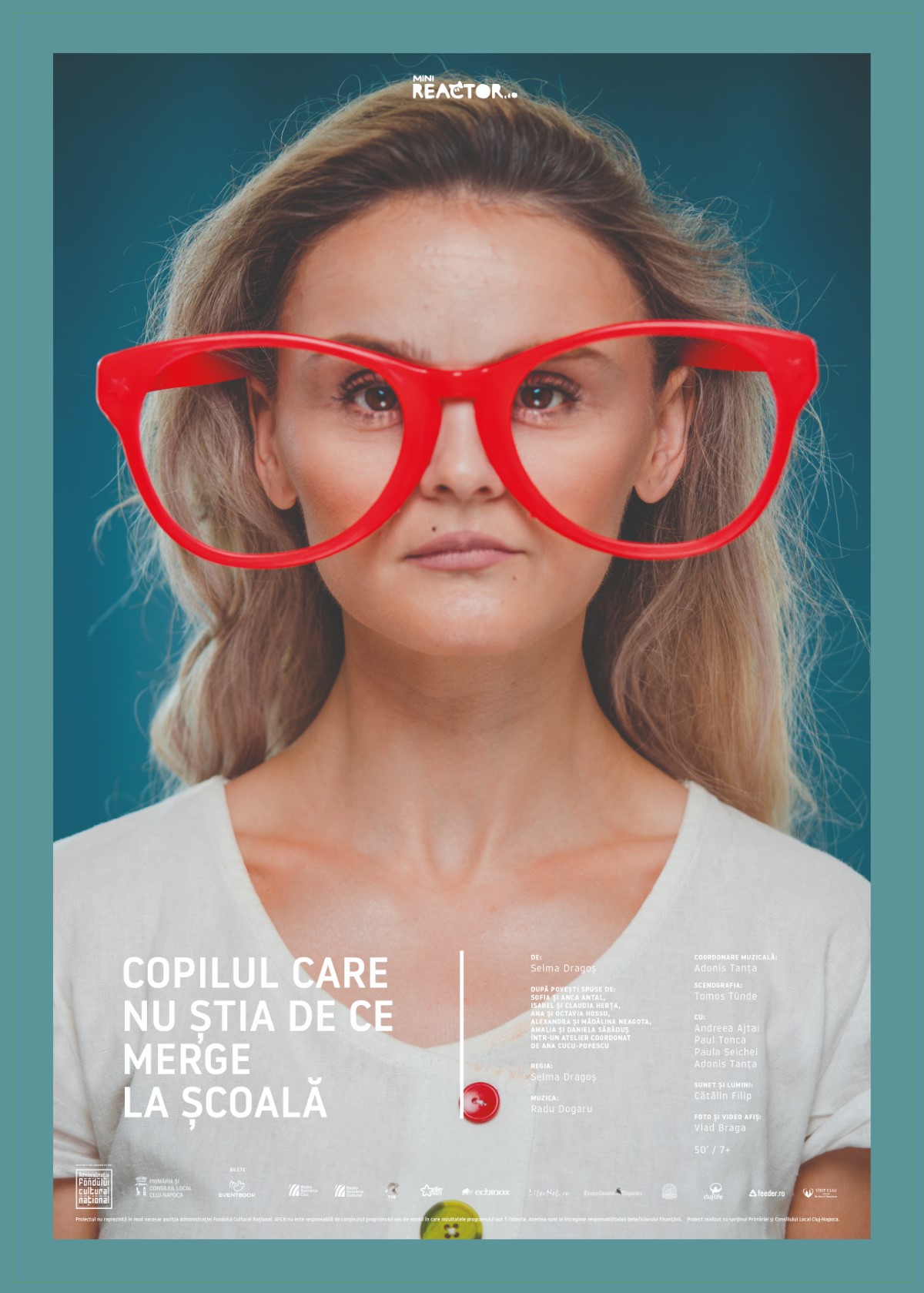11 November| 09:30 – Tudor Arghezi Secondary School
CLOSED CIRCUIT EVENT

For Andrei, who is just starting school alongside Matei and Sofia, with a very kind and gentle teacher, school is a mystery. Why must he go to school? The teacher sings and plays with the students, but does not seem to have too many answers. The unhappy parents complain and the Sinister sends the teacher a pair of magical glasses, who make her not see anything good in the children anymore. Life at school and at home becomes increasingly hard for the three children. What can be done?
The performance follows a young teacher at the beginning of her career and her students, from their first day of school up until the 4th grade.
By: Selma Dragoș
After stories told by: Sofia și Anca Antal, Isabel și Claudia Herța, Ana și Octavia Hossu, Alexandra și Mădălina Neagota, Amalia și Daniela Săbăduș într-un atelier coordonat de Ana Cucu-Popescu
Cast:
Sofia: Andreea Ajtai
Matei: Adonis Tanța
The Teacher: Paula Seichei
Andrei: Paul Tonca
Directed by: Selma Dragoș
Set design: Tomos Tünde
Original music: Radu Dogaru
Light design and sound design: Cătălin Filip
Producer: MiniREACTOR, Cluj
Duration: 50 min
Not suitable under 7 years of age
https://reactor-cluj.com/spectacol/copilul-care-nu-stia-de-ce-merge-la-scoala/
This is a musical performance in which the instruments are extensions of the characters, helping them express themselves, learn and create harmonies together.
The text is based on stories, characters and observations provided by a group of mothers and their daughters, all in their first grades in Zalău. Resemblances to real life are intentional, and the songs and the mocking of adults are meant to distance us from the methods and the attitudes with which children learn to abandon hope because we, the adults, do not question these too often.
The transformation of the teacher in a “witch” is based on the observations of a girl who wonders why, during the weeks when the students were observed by a constantly unhappy and angry lady, the children themselves became “bad”. “The street lamp” is a real method used by some teachers to keep the discipline in the classroom, and the aria and the song of the street lamp were inspired by the comparison made by a mother and daughter between the rules and colors: if the colors and discipline become too important, we get to a point where we only know three colors in the whole world. The image of parents obsessed by grades like Very Well, Well, Plus has its origins in the comments of mothers regarding the pressure they feel they need to put on the children to get good grades, and to get to performance levels that can guarantee their freedom of choice sometime in the future (one mother put it like “we, parents, become a sort of grades chasers.”)
Why do we have to go to school is one of those questions to which children get an answer ever since they are little, before they can even ask that question. For their sake and the sake of the society we are preparing them for, we need to ask that question over and over again, until we don’t know why anymore. And we are thus ready to find out.
While for other children things seem pretty clear, Andrei does not understand why he must go to school. The teacher accepts and encourages questions, because she trusts that the answers will show up too.
Alarmed that the teacher’s methods do not guarantee total success, the parents make a complaint. The Sinister Minister decides that there is a need for more discipline. Hence, the teacher receives a tool to help her keep the order: long distance glasses that make her see things in a much simpler manner, to avoid mistakes, questions and doubts through sanctions. In the eyes of the children, her transformation is like an evil spell, who transforms them too from inquisitive merry children in stupid, fearful little soldiers.
The parents are convinced that the upset and the stress of their children are a good sign – school “must be hard in order to be good”, the ultimate goal is the good mark, a guarantee of happiness and success.
Seeing his classmates just as scared and confused, Andrei starts a rebellion. The children join him. To their surprise and relief, it is not the teacher who is their enemy.
Credit photo: Cătălin Grigoriu
